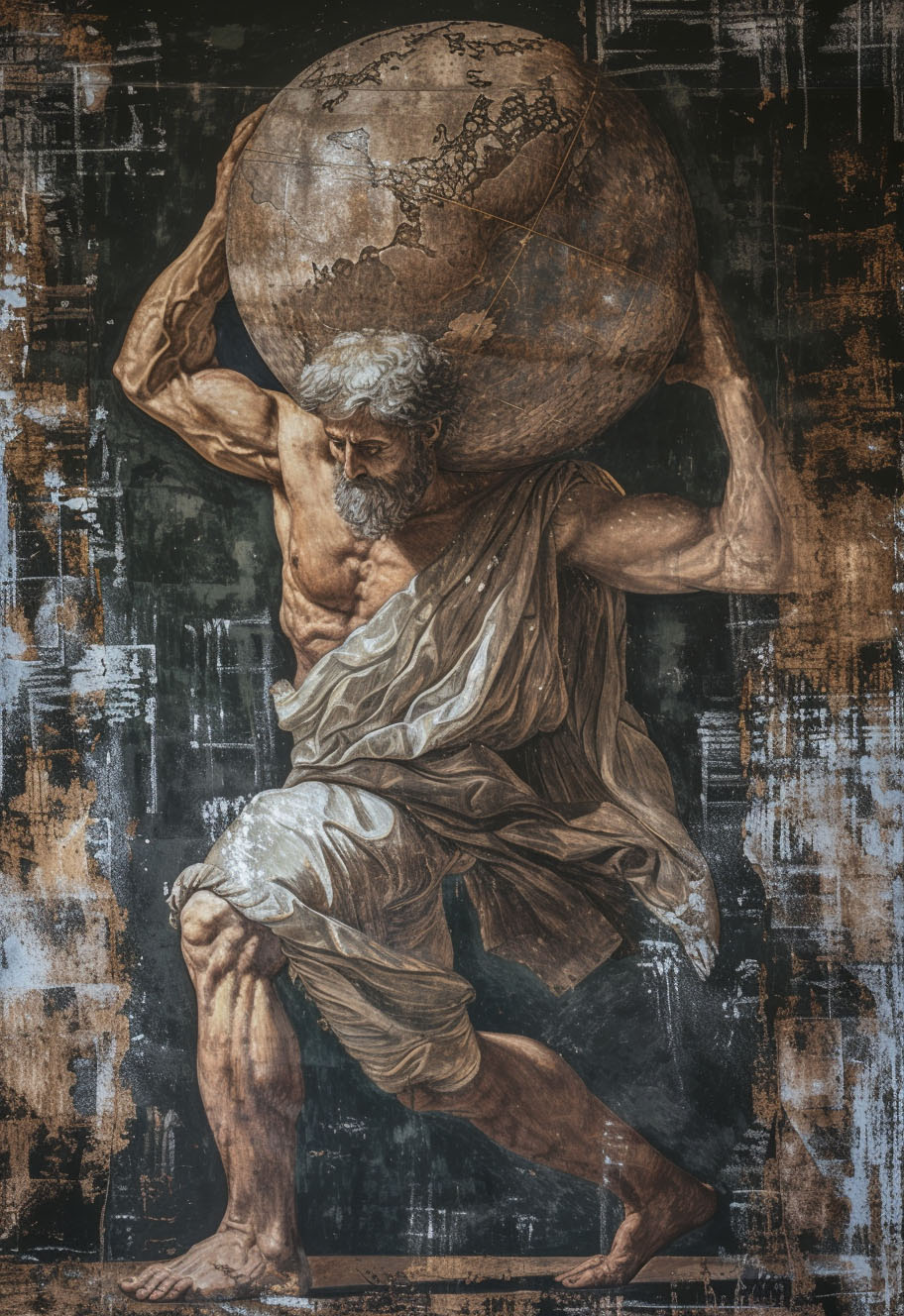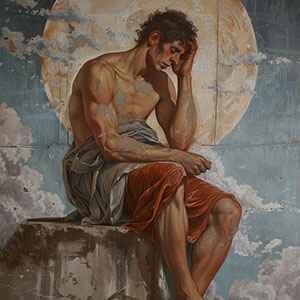Atlas
In Greek mythology, Atlas is a Titan who is often associated with the bearing of the heavens or the celestial sphere on his shoulders. Here are key aspects of Atlas in Greek mythology:
Parents: Iapetus & Clymene
Siblings: Prometheus, Epimetheus, Menoetius
Consort: NA
Children: Hesperides, Pleiades

Parentage: Atlas is the son of the Titans Iapetus and Clymene, making him a second-generation Titan in Greek mythology. His siblings include Prometheus, Epimetheus, and Menoetius.
Titanomachy: During the Titanomachy, the war between the Titans and the Olympian gods, Atlas sided with the Titans. After the Titans were defeated, Zeus condemned Atlas to carry the heavens on his shoulders.
Punishment: Atlas's punishment of holding up the celestial sphere is often portrayed as a consequence of his role in the Titanomachy. This task was meant to be an eternal burden, symbolising the weight of the heavens.
Heracles and the Golden Apples: In one of the labors of Heracles (Hercules), Heracles sought the golden apples of the Hesperides, which were guarded by the dragon Ladon. Atlas, who was nearby, agreed to retrieve the apples for Heracles if the hero would temporarily take on the burden of the heavens. Heracles agreed, and Atlas went to retrieve the apples.
Celestial Sphere: The depiction of Atlas carrying the heavens is a symbolic representation of the celestial sphere, which encompasses the stars and planets. In some versions of the myth, Atlas is said to hold the earth on his shoulders, but the celestial sphere is a more common interpretation.
Location: In ancient Greek cosmology, Atlas was often associated with the western edge of the world, near the Atlas Mountains in North Africa. This association contributed to the name of the mountains.
Family: Atlas is sometimes mentioned as the father of the Hesperides (nymphs of the evening) and the Pleiades (a group of seven celestial sisters). The identity of their mother varies in different accounts.
Cultural Influence: The image of Atlas carrying the celestial sphere has become a popular symbol in art, literature, and modern culture. It is often used to represent the burden of responsibility or the weight of the world on one's shoulders.
Astronomy: The term "atlas" is sometimes used in astronomy to refer to a collection of maps or charts reflecting the association of Atlas with the celestial sphere.
Roman Equivalent: In Roman mythology, Atlas is often identified with the Titan named Atlantis.
Atlas's enduring image as the Titan who bears the heavens has made him an iconic figure in Greek mythology. The symbolism of Atlas carrying the celestial sphere continues to resonate in various cultural contexts, representing the endurance of burdens and the challenges of the world.
Immediate Family

Clymene
Quick Facts
- He is a second-generation Titan.
- Atlas sided with the Titans during the Titanomachy.
- His punishment is to carry the heavens on his shoulders.
- Atlas helped Heracles in retrieving the golden apples.
- He is associated with the celestial sphere and the Atlas Mountains.
- Atlas is sometimes considered the father of the Hesperides and Pleiades.
- His image is widely used as a symbol of responsibility and burden.
- The term "atlas" in astronomy reflects his association with the celestial sphere.
- In Roman mythology, he is identified with the Titan Atlantis.
Further Reading
Art &
Architecture
Ancient Greek art and architecture, with its harmonious proportions and timeless elegance, continue to inspire awe and admiration millennia later.
Discover
Greek Mythology & Mythical Characters
Greek mythology, a rich tapestry of gods, heroes, and mythical creatures, captivates the imagination with its tales of love, betrayal, and epic adventures that delve into the depths of the human psyche.
Discover
Ancient Greek History
Ancient Greek history, marked by remarkable achievements in democracy, philosophy, and warfare, shaped the foundation of Western civilization, leaving an indelible legacy of innovation and cultural influence that continues to resonate to this day.
Discover
Ancient Greek Olympics
The ancient Greek Olympics, held in Olympia every four years, celebrated athleticism, unity, and cultural pride, serving as a testament to the enduring spirit of competition and excellence that transcends time and borders.
Discover
Ancient Greek Wars
Ancient Greek wars, such as the Persian Wars and the Peloponnesian War, were pivotal conflicts that shaped the course of history, highlighting the struggle for power, independence, and the clash of civilizations in the ancient Mediterranean world.
Discover
Ancient Greek Culture and Society
Ancient Greek culture and society, characterized by its emphasis on art, philosophy, and civic engagement, fostered a vibrant intellectual and social landscape where innovation flourished, democracy thrived, and the pursuit of knowledge and excellence was celebrated as fundamental values of civilized life.
Discover
